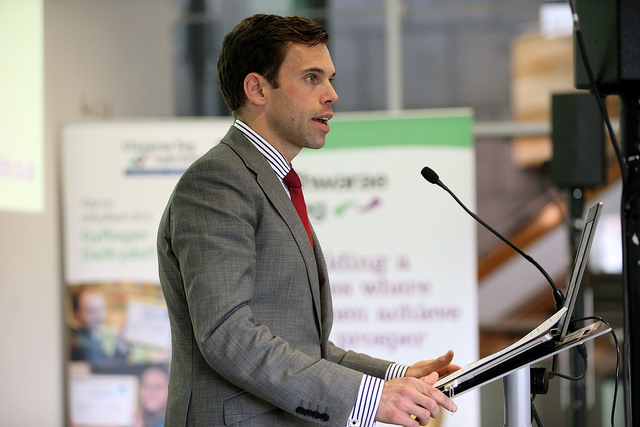
Ken Skates, Minister for Economy and Infrastructure at Welsh Government
Photo: Chwarae Teg - Photo Collection via Visual hunt / CC BY-NC-SA
Welsh Government expands anti-poverty arts programme
A successful pilot of the ‘Fusion’ programme is credited with engaging nearly 5,000 people across Wales since its launch in 2015.
The Welsh Government has backed a new phase of an arts programme focused on tackling poverty in disadvantaged areas of the country.
Eight cultural projects are sharing over £200k per annum through ‘Fusion’, which expands across Wales this year following a two-year pilot of the programme.
Run by the Museums, Archives and Libraries Division of the Welsh Government, Fusion supports two-year strategic initiatives that use culture or heritage to empower people from economically disadvantaged communities, by improving employment prospects, teaching new skills and improving physical and mental health.
“Fusion is an innovative, low-cost intervention that promotes collaboration to better serve the needs of the people of Wales,” said Ken Skates, Minister for Economy and Infrastructure.
“Since the launch of the Fusion programme we have worked with local authorities, heritage sites, theatres and others to encourage thousands of people who might not normally have engaged in cultural activities to get involved.
“I am very pleased to be able to allocate more than £200k to eight new projects across Wales that will enable this important work to continue.”
Successful grants
Up to £40k in funding per annum for two years has been awarded to eight cultural projects that deliver objectives supporting the seven Fusion indicators, which include:
- employability and skills;
- supporting the early years; and
- supporting health and wellbeing.
Torfaen County Borough Council and Caerphilly County Borough Council receive the largest award for 2017-18 of £40k for their partnership. They will employ a full-time Fusion co-ordinator and work with cultural partners to support the “most vulnerable and disengaged” individuals across both authorities by tackling barriers to employment and supporting educational attainment.
Other organisations to receive funding include:
- Cardiff Story Museum, which receives £25k to work with national and local cultural heritage partners to deliver learning opportunities and skills development, as well as activities for children, young people and the elderly
- The City of Newport Council, which receives £25k to employ a part-time coordinator and work with partners including Newport Museum, Cadw, and National Museum Wales to deliver opportunities for young people
- Neath Port Talbot Homes, which receives £25k to use creativity and culture to support skills and attainment for young people and their families, with a particular focus on promoting progression into the developing film industry in south Wales.
In addition to Fusion, the Welsh Government has pledged to develop a programme of “high-quality training placements” in partnership with the Heritage Lottery Fund and Creative & Cultural Skills, and to create “powerful cultural programmes for young people”.
Addressing poverty
Fusion was established in response to Baroness Kay Andrews’ report on ‘Poverty and Culture’ and Professor Dai Smith’s report on the Arts in Education.
The programme was initially trialled to explore how cultural activity could tackle poverty in ‘Pioneer Areas’ that were located within deprived communities identified by the government’s Communities First programme, which is now being phased out.
An evaluation of the first year of the programme was positive about how it encouraged collaborative working among the organisations involved, and shifted their focus to tackling poverty in their areas.
It found some evidence that the programme was having a positive impact on individual participants, helping them to develop soft skills such as increased confidence, motivation and social engagement.
The project is credited with reaching over 5,000 people between 2015 and 2017, and involving more than 150 partners across ten areas.
“The involvement of a wide range of cultural partners with a specific remit around tackling poverty, and the ability of partnerships in each area to encourage new partners to increase their engagement with cultural provision, has contributed to the success of the pilot programme,” it said.
Join the Discussion
You must be logged in to post a comment.